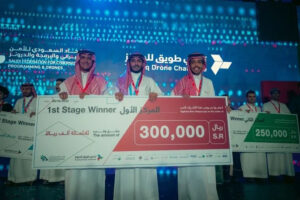 The competition, featuring 112 competitors from seven countries, declared five winners who received a total prize worth SR1 million ($265,000). (Supplied)
The competition, featuring 112 competitors from seven countries, declared five winners who received a total prize worth SR1 million ($265,000). (Supplied)
MOON Desk: Tuwaiq Drones Challenge, the largest drone competition in the region, ended on Thursday in Riyadh at the Tuwaiq Academy at Princess Nourah bint Abdulrahman University.
The competition, featuring 112 competitors from seven countries, declared five winners who received a total prize worth SR1 million ($265,000).
The Saudi Federation for Cyber Security and Programming, in collaboration with the German Dronemasters Academy, which has a wealth of drone-related experience, oversaw the challenge’s planning and execution.
The Tuwaiq Drones Challenge included an intensive training program provided by specialized experts for five days followed by a hackathon to come up with innovative ideas and solutions by employing drone technologies within three days.
Over the course of 10 days, the participants fought to find innovative technical solutions with civil uses that benefit a number of vital sectors in the Kingdom, primarily the oil and gas, industrial and logistical, agricultural and environmental, real estate and construction sectors.
The “D4F”, “CyberWings,” and “Well 7” groups won the challenge on revealing infrastructures.
The “Flying Robotics” team won for best drone delivery system, and “UAS-Falcons” picked up a prize for reducing the dangers of leaking gases.
Faisal Al-Khamisi, chairman of the board of directors of the Saudi Federation for Cyber Security and Programming, was praised the participation of the winning teams and their efforts during the challenge.
Abdullah Al-Asmari, a member of “Flying Robotics,” said that it was a tough 10 days but securing fourth place was an excellent reward.
“We worked all night to finish this project, so I can’t begin to express how happy we are to have won. Although teamwork can be difficult at times. We managed to get through and win.”
A member ofUAS-Falcon,” Mutaz Al-Tayyar, told Arab News: “I have proud feelings for myself and my team because the competition was challenging, and we are inventing solutions that will help governmental sectors, which is amazing. These 10 days were hard, but we managed to find a solution for a problem in the challenge of reducing the dangers of leaking gases.”
CEO of the federation, Mutaib Al-Quni, said: “The federation has worked over the past two years to raise national capabilities in the fields of cybersecurity and programming through qualitative courses, programs, and training camps with many local and international partners.”





